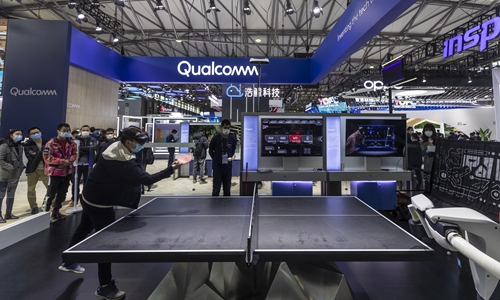
A man plays table tennis with a robot on Qualcomm booth at the MWC (Mobile World Congress) Shanghai 2021 in Shanghai on February 23. Photo: IC
Technology companies participating in the MWC Barcelona are eyeing the metaverse, an area blending physical and digital experiences and possibly unlocking new digital business models.
As edge computing and 5G networks are making it happen, analysts said that China has advantages in communications infrastructure due to its massive 5G rollout.
Companies revealed their latest plans and achievements related to the metaverse at MWC Barcelona 2022, formerly known as Mobile World Congress, which kicked off in Barcelona on Monday.
Recently, China Mobile has created a number of ice and snow science and technology applications, including XR Studio and AR Ice and Snow Town, in combination with the computing power network and the concept of the metaverse, the company told the Global Times.
Facebook, which last year changed its name to Meta, announced at MWC22 it will establish a Metaverse Innovation Hub in Madrid with telecom operator Telefónica, to accelerate the metaverse network and device readiness through efforts like trials, use cases and device testing, media reports said.
In essence, the metaverse is a "digital space and time" that integrates and develops with the real society. It requires strong network support and advanced artificial intelligence (AI), virtual reality (VR), augmented reality (AR), Internet of Things (IoT) and other technologies, Ma Jihua, a veteran industry analyst, told the Global Times on Tuesday.
"In these aspects, China's 5G wireless network and gigabit broadband are at the world's advanced level, which can be said to be the best among major economies.
"The development is rapid, which ensures that China has the ability to be the first to complete the digital construction, which is conducive to the realization of the metaverse," said Ma.
AI and VR have witnessed rapid development in China in recent years. China ranked first in the world in terms of application and technology patents for AI, VR and IoT, said Ma.
The 5G network is the base for the development of VR and IoT, and China is a leading market for 5G adoption, said Global System for Mobile Communications Alliance (GSMA).
In 2021, China announced policies related to the VR industry, mainly focusing on the deep application and industrial integration of new technologies such as VR, blockchain, edge computing, big data and AI.
According to an industry analysis released in June 2021, China's VR/AR terminal hardware shipments will increase to 60 million by 2025. It is estimated that the market for China's VR/AR terminal hardware in 2025 will be 179.8 billion yuan ($28.5 billion).
Economic and social development is moving toward integration of the real and virtual worlds. With the expansion of connected objects and the upgrading of infrastructure, new models such as the metaverse are emerging, China Mobile Chairman Yang Jie said on Monday at MWC22, according to a press release sent from China Mobile to the Global Times.
It is expected that by the end of 2022, China Mobile will have 1 million 5G base stations installed, with about 330 million 5G end users.
At present, more than 1.42 million 5G base stations are installed in China, and the number will reach 2 million at the end of 2022, the Ministry of Industry and Information Technology said on Monday.
Huawei, a major 5G gear supplier attending the MWC Barcelona, said that it will help telecom operators with digital technologies. Together with operators and partners, Huawei has signed more than 3,000 commercial contracts for 5G applications, the company told the Global Times on Tuesday.
"The development of the metaverse needs further breakthroughs in technology, which requires Chinese high-tech companies to strengthen the research and development of relevant technologies," said Ma.
But Zhang Xiaorong, director of the Beijing-based Cutting-Edge Technology Research Institute, cautioned about the abuse of the metaverse.
"Some gaming companies and other companies that provide software and hardware for games are also getting involved in the metaverse with marketing gimmicks. It's just that some of the declining technology manufacturers have given themselves a new name," Zhang told the Global Times on Tuesday.
Zhang said that AI companies and cloud computing vendors, which are real high-tech players, are more sober, and few claim to belong to the metaverse.




